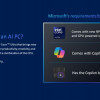Class-action lawsuits for software: Why Apple would win
Note: This article first appeared over at our affiliates site http://www.techfocus.org. The original article can be found here
By: DietCoke
This week, Wired News and many other news outlets reported that one of Apple’s software packages, named iTunes, has the unfortunate side-effect of wiping out hard drives with multiple partitions. Primarily this is happening on MacOS X, and Apple has posted an updated package that resolves this issue. The results of this fiasco, however, are the words “class-action” by affected users who lost all their data on those drives.
The defective tire lawsuits surrounding the Ford Motor Company and Bridgestone/Firestone are based around the premise that Ford and the tire maker were aware of the defects which caused tire separation, which as a result caused the deaths of scores of people. Many class-action suits are generally based around events or products in which a danger was known to exist prior to the introduction to the plaintiff which endangered or harmed the plaintiff(s). Mp3newswire probably has the best description of the purpose of a class-action suit:
“A class-action suit is how the average person lays their claims en masse against big companies with the assets to actually afford to pay restitution to thousands”
There is a difference between Ford/Firestone and this Apple case, however, which may render a class-action suit futile.
Ford/Firestone tires were limited to several standardized models. The hard-drive-wipe problem with iTunes ranges between all different sizes of hard drives and partitions. QA generally involves testing on popular models, and not every user scenario.
Apple presumably did not release this software with prior knowledge of defects. The lack of prior notification works in their favor on this matter as well.
Users can reportedly recover their data sometimes, using Symantec products. In order to prove irreparable harm, the user must prove that they have taken steps suggested to resolve the issue.
Quick response – Apple responded almost immediately with a fix. This bodes well for them and is a solid “plus” in litigation.
Do keep in mind that I’m not an attorney and none of this should constitute legal advice. However, depending on the amount of users affected, Apple would be well served to do any or all of the following:
Send a notice to each registered Apple user notifying them of the problem (if they have not already done so – I’m not aware of them doing so yet.)
Reach an agreement with Symantec for either a demo of the software required to recover data, or a time-limited, full-version copy for users.
Re-examine the Quality Assurance process. This is not the first major issue for MacOS X users – a review needs to take place, with a subsequent implementation of steps to improve the process.
Software manufacturers have a difficult task. They have to produce software on many systems which are not identical, which have different applications which may not be compatible with theirs, and they have to produce software on an increasingly short production-span. At the same time, Apple does produce their own computers, which limits the excuse that they can’t test every system. You can’t test every system, but you can test each model with the software and different hardware configurations. There’s no excuse for not doing this, no matter what the time frame. If you can’t make it in that time frame, you shouldn’t be shipping the product to begin with.
This sort of situation is similar to issues all software manufacturers have all the time – and any software manufacturer should follow guidelines to stay in touch with their users. Failing to do so does warrant class-action status. In this case, however, it’s going to be tough for Apple users to recover. There’s one way to get through to Apple on this one: deluge them with calls on the issue. At a certain point, the recovery effort becomes more costly than additional QA. At that point, quality software is much more likely. I certainly hope it works in this case.
1.) Editorial Response to Microsoft - madirish
2.) WCG Malaysia: A Quaker's POV - biatch0
3.) Class Action Lawsuits for software: Why Apple would win - DietCoke
4.) The cheque's in the mail - Dinesh Nair
5.) CounterStrike 1.3 - A complete failure - DietCoke
6.) When Does Gaming Become Unhealthy? - Archfiend









































































